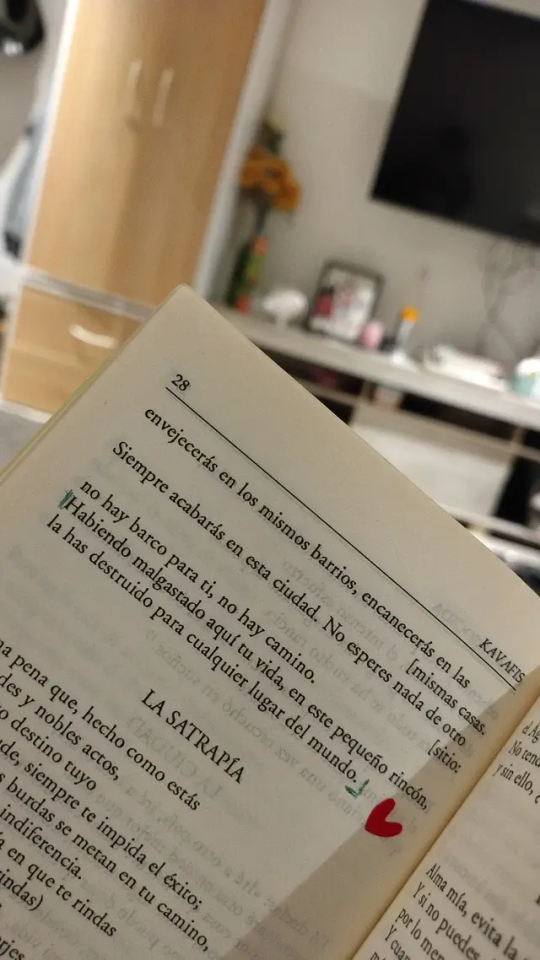#kavafis
Explore tagged Tumblr posts
Text
Devi augurarti che la strada sia lunga e che i mattini d’estate siano tanti. Devi avere Itaca sempre in mente: raggiungerla sia il tuo pensiero costante. Ma non affrettare il viaggio, fa che duri a lungo e che da vecchio tu metta piede sull’isola, ricco di quello che hai trovato per la via, senza aspettarti altre ricchezze. Itaca ti ha dato il viaggio: senza di lei non lo avresti intrapreso. E se ti appare povera non per questo Itaca ti avrà illuso. Carico di saggezza e di esperienza avrai capito ciò che Itaca rappresenta.
Costantino Kavafis - "Itaca"
30 notes
·
View notes
Text
artık müzikte "şiirsel içerikler" aramayı, yazında "sözcüklerin müziğinin" peşinde koşmayı bıraktın.
konstantin kavafis - selected poems
#kitap#edebiyat#blogger#felsefe#kitaplar#blog#kitap kurdu#charles bukowski#friedrich nietzsche#şiir#konstantinos kavafis#konstantin kavafis#kavafis#cavafy#vangelis#yorgo seferis#yannis ritsos#selected poems#poems#seçilmiş şiirler#federico garcía lorca#gabriel garcia marquez#orhan pamuk#d.h. lawrence#lale müldür#ahmet hamdi tanpınar#mahur beste#çalıkuşu#sabahattin ali#kürk mantolu madonna
10 notes
·
View notes
Text

58 notes
·
View notes
Text
Dünyanın en güzel şiiri
Dünyanın en güzel şarkısı
5 notes
·
View notes
Text
ÍTACA
de Konstantino Kavafis
(Alejandría, Egipto, 1863 – 1933)
Cuando emprendas tu viaje a Ítaca
pide que el camino sea largo,
lleno de aventuras, lleno de experiencias.
No temas a los lestrigones ni a los cíclopes
ni al colérico Poseidón,
seres tales jamás hallarás en tu camino,
si tu pensar es elevado, si selecta
es la emoción que toca tu espíritu y tu cuerpo.
Ni a los lestrigones ni a los cíclopes
ni al salvaje Poseidón encontrarás,
si no los llevas dentro de tu alma,
si no los yergue tu alma ante ti.
Pide que el camino sea largo.
Que muchas sean las mañanas de verano
en que llegues -¡con qué placer y alegría!-
a puertos nunca vistos antes.
Detente en los emporios de Fenicia
y hazte con hermosas mercancías,
nácar y coral, ámbar y ébano
y toda suerte de perfumes sensuales,
cuantos más abundantes perfumes sensuales puedas.
Ve a muchas ciudades egipcias
a aprender, a aprender de sus sabios.
Ten siempre a Ítaca en tu mente.
Llegar allí es tu destino.
Mas no apresures nunca el viaje.
Mejor que dure muchos años
y atracar, viejo ya, en la isla,
enriquecido de cuanto ganaste en el camino
sin aguardar a que Ítaca te enriquezca.
Ítaca te brindó tan hermoso viaje.
Sin ella no habrías emprendido el camino.
Pero no tiene ya nada que darte.
Aunque la halles pobre, Ítaca no te ha engañado.
Así, sabio como te has vuelto, con tanta experiencia,
entenderás ya qué significan las Ítacas.
Edición y traducción de Pedro Bádenas de la Peña, para Antología poética, de Alianza Editorial. Madrid, 1999.
10 notes
·
View notes
Text
E se non puoi la vita che desideri cerca almeno questo per quanto sta in te: non sciuparla nel troppo commercio con la gente con troppe parole in un viavai frenetico. Non sciuparla portandola in giro In balìa del quotidiano gioco balordo degli incontri e degli inviti, fino a farne una stucchevole estranea.
Constantinos Kavafis
2 notes
·
View notes
Text
Recopilación de textos fotografiados. Kavafis

View On WordPress
2 notes
·
View notes
Text
Pale as a corpse
#female manipulator#femcel#cavafis#kavafis#cillian murphy#poetry#gloomy coquette#feminine urge#coqeutte#born to die
4 notes
·
View notes
Text

bir gemi yok, bir yol yok sana
kavafis
#kitap#edebiyat#blogger#felsefe#kitaplar#blog#kitap kurdu#şiir#poems#charles bukowski#constantine cavafy#cavafy#konstantinos kavafis#konstantin kavafis#kavafis#giorgos seferis#yannis ritsos#poema#poetry#love poems#poem#vangelis#music#portrait#portre#art photo#art history#artist#artist on tumblr#art photography
8 notes
·
View notes
Text

Este verso siempre destruye. Del poema La Ciudad de Kavafis
0 notes
Text
Gerçekleşmeden - bir tek ateşli gecenin
ya da ayaydın seherin zevkine erişmeden-
geçip giden istekler,
yaşlılığı bilmeden göçenlerin cesetleri gibidir,
gözyaşları gibi görkemli mezarlara gömülen,
başuçlarında güller, ayaklarında yasemin...
4 notes
·
View notes
Text
Itaca - Costantino Kavafis
Quando ti metterai in viaggio per Itacadevi augurarti che la strada sia lunga,fertile in avventure e in esperienze.I Lestrigoni e i Ciclopio la furia di Nettuno non temere,non sarà questo il genere di incontrise il pensiero resta alto e un sentimentofermo guida il tuo spirito e il tuo corpo.In Ciclopi e Lestrigoni, no certo,né nell’irato Poseidone incapperaise non li porti dentrose l’anima non te…

View On WordPress
1 note
·
View note
Text
Cuaderno de poemas. C. Kavafis
No hallarás otra tierra ni otra mar.La ciudad irá en ti siempre. Volverása las mismas calles. Y en los mismos suburbios llegará tu vejez;en la misma casa encanecerás.Pues la ciudad siempre es la misma. Otra no busques—no la hay—,ni caminos ni barco para ti. C. Kavafis

View On WordPress
1 note
·
View note
Text
youtube
#poetas
0 notes
Text
La ciudad, Kavafis
Dijiste: «Marcharé a otra tierra, marcharé a otro mar.
Habrá de hallarse en algún sitio una ciudad mejor.
Mas cada intento mío está condenado al error;
sepulto -como muerto- el corazón.
Y cuánto va a durar mi mente en esta confusión.
Dondequiera que mire, que vuelva mis ojos,
solo veo aquí de mi vida los despojos,
y tantos años que pasé y perdí en este lugar».
Lugares nuevos no hallarás, ni hallarás otros mares.
La ciudad irá tras de ti. En tus calles pasearás,
las mismas, y en los mismos barrios envejecerás,
se te verá en estas casas acabarte.
Y siempre llegarás a esta ciudad. Para otra parte
-no esperes- no hay barco ya, ni senda para ti.
Lo mismo que tu vida la perdiste aquí,
en esta esquina, la perdiste en todos los lugares.
0 notes
